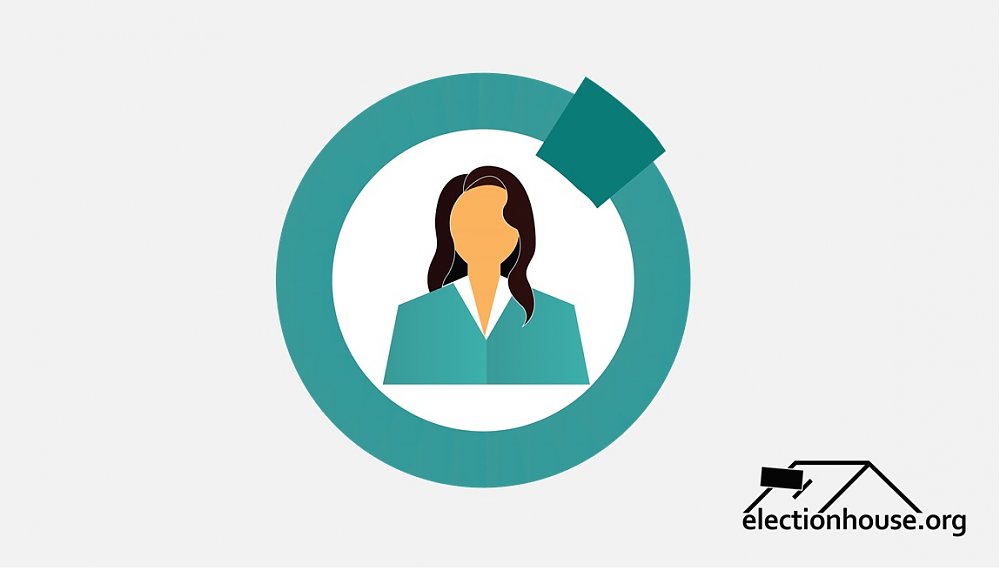Adakah kata “perempuan” dalam konstitusi Indonesia? Jawabannya, “ada”. Identitas warga perempuan amat kuat dijamin Undang-Undang Dasar Negara Republik Indonesia 1945. Kesadaran terhadap keadaan hukum afirmatif ini semakin menyimpulkan diskriminasi perempuan di Indonesia sebagai tragedi yang ironis, khususnya dalam pemilu.
Pertanyaan dan jawaban tentang jaminan hukum tertinggi negara itu penting disampaikan pada konteks Pemilu 2024. Ini bertepatan dengan Komisi Pemilihan Umum (KPU) yang mengeluarkan Peraturan KPU 10/2023. Pasal 8 ayat (2) peraturan ini menyadarkan, ternyata capaian afirmasi perempuan selama ini belum menjamin kerentanan perempuan berpolitik. Sebaliknya, melalui produk hukum yang rendah dalam heirarki peraturan perundang-undangan, afirmasi perempuan dalam konstitusi dan undang-undang bisa runtuh begitu saja. Cita kelembagaan politik yang representatif, kembali menemukan badai diskriminatif.
Penggenapan ke bawah persentase perempuan dalam daftar calon tiap daerah pemilihan menjadi antiklimaks afirmasi perempuan dalam tren kewenangan KPU. Sebelumnya, anggota KPU cenderung membuat PKPU yang lebih menguatkan perempuan. Malah, Pasal 8 ayat (2) PKPU 10/2023 berbeda 180 derajat dengan PKPU sebelumnya. Misal, PKPU dalam Pemilu Legislatif 2014, KPU menjamin 30 persen pencalonan perempuan tiap dapil.
“Perempuan” dalam konstitusi
Kata perempuan ada dalam konstitusi kita. Tepatnya pada Pasal 28H Ayat (2) Undang-Undang Dasar Negara Republik Indonesia Tahun 1945. Pada pasal ini, kata “perempuan” ditulis bukan dengan kata “perempuan”. Salah satu pasal hasil amendemen kedua ini menuliskan kata “perempuan” dengan kata “setiap orang”.
Pasal itu berbunyi: Setiap orang berhak mendapat kemudahan dan perlakuan khusus untuk memperoleh kesempatan dan manfaat yang sama guna mencapai persamaan dan keadilan.
Kata “setiap orang” pada pasal itu, seharusnya adalah kata “perempuan”. Mengapa? Jawabannya karena pasal itu buah dari perjuangan kelompok perempuan politik dalam amendemen undang-undang dasar.
Penjelasan itu bisa kita buktikan dan kita dapatkan dasar hukumnya dalam risalah proses amendemen undang-undang dasar pasca-Reformasi. Dalam Buku VIII - Naskah Komprehensif Perubahan Undang-Undang Dasar Negara Republik Indonesia Tahun 1945 (Sekjend Mahkamah Konstitusi, 2010), tertulis jelas bahwa konten Pasal 28H Ayat (2) UUD NRI 1945 bisa ada karena upaya kuat yang luar biasa dari gerakan politik perempuan.
Valina Singka Subekti merupakan nama perempuan politik yang secara percaya diri serta tinggi kualitas menyampaikan politik afirmasi perempuan dalam perubahan undang-undang dasar Indonesia. Akademisi Ilmu Politik Fakultas Ilmu Sosial dan Ilmu Politik (FISIP) Universitas Indonesia (UI) ini mewakili Fraksi Utusan Golongan (FUG) Majelis Permusyawaratan Rakyat (MPR). Ia dengan baik menjelaskan prinsip hak asasi manusia yang harus dijamin dalam konstitusi.
Valina mengingatkan bahwa, salah satu prinsip HAM adalah prinsip keadilan gender. Ia menjelaskan bahwa, konstitusi harus menjamin prinsip persamaan tanpa diskriminasi berdasarkan jenis kelamin dan gender. Perempuan yang kini menjadi profesor di FISIP UI ini merujuk Deklarasi Wina yang disepakati lebih dari 170 negara (termasuk Indonesia) pada 1993. Dokumen hukum internasional telah memberi pengakuan bahwa hak asasi perempuan adalah bagian dari HAM yang integral, tidak dapat dicabut, dan tidak dapat dipisahkan.
Lebih jauh, Valina menjelaskan bahwa, substansi HAM tidak hanya terbatas pada hak-hak sipil politik, hak-hak ekonomi, hak-hak sosial budaya, tetapi juga pentingnya memasukkan mengenai hak asasi perempuan. Menurutnya, ini juga berkaitan dengan soal wacana yang menjadi arus utama di dunia, mengenai demokrasi, kebebasan, HAM, dan lingkungan hidup.
Capaian politik hukum
Eksistensi gerakan politik perempuan dalam amendemen konstitusi lahirkan dinamika pembahasan politik afirmatif yang melahirkan Pasal 28H Ayat (2) UUD NRI 1945. Identitas politik perempuan mengembangkan pembahasan tentang identitas kelompok rentan lainnya seperti anak dan warga lanjut usia (lansia). Jaminan hukum tertinggi ini yang kemudian dioptimalkan kelompok perempuan dalam mengadvokasi hukum pada tingkatan undang-undang.
Jika kita menempatkan warga negara mempunyai ragam identitas sosial, tampaknya perempuan merupakan identitas yang paling banyak ditulis dalam undang-undang. Kita bisa sebut sejumlah judul undang-undang yang khusus mengafirmasi perempuan. Ada UU Penghapusan Kekerasan dalam Rumah Tangga. Ada UU Pemberantasan Tindak Pidana Perdagangan Orang. Atau yang belakangan sah secara fenomenal ada UU Tindak Pidana Kekerasan Seksual.
Di tema atau judul undang-undang dan peraturan lain, identitas perempuan hadir dalam bentuk pengarusutamaan gender bidang hukum. Adanya entitas gender dalam hierarki peraturan perundangan-undang berkonsekuensi pada alokasi anggaran serta pendidikan dan pelatihan bagi perempuan.
Dalam undang-undang politik, dilahirkan sejumlah bentuk ragam afirmasi pada banyak undang-undang. Kata “perempuan” hadir dalam undang-undang partai politik, undang-undang pemilu, dan undang-undang pilkada. Perempuan ditulis secara khusus menyertai perlakuan khusus, di antaranya sebagai kuota gender dan kuota pemilu.
Kuota gender nyata diwujudkan dalam Undang-Undang Partai Politik. Bentuknya adalah kewajiban bagi tiap partai politik untuk menjadi badan hukum harus mempunyai perempuan minimal 30 persen dalam pengurus. Hal ini dimaksud untuk memastikan adanya representasi perempuan yang setara dalam daftar calon legislatif partai politik.
Kuota pemilu, merupakan konsekuensi dari kuota gender dalam partai politik. UU 7/2017 tentang Pemilihan Umum paling aktual menjamin kuota pemilu. Dalam ketentuan hukum ini, perempuan dikuatkan hadir minimal 30 persen sebagai peserta pemilu dan penyelenggara pemilu. Bahkan, partai politik diwajibkan memenuhi kuota minimal 30 persen calon perempuan dalam daftar calon anggota legislatif yang diajukan, yang jika dilanggar, partai politik tidak bisa menjadi peserta pemilu.
Sayangnya, pada konteks Pemilu 2024, semua jaminan konstitusi dan undang-undang tersebut hancur dengan aturan teknis KPU. Jika kita mengingat kembali konteks Pasal 28H Ayat (2) UUD NRI 1945, ini akan membuat kelompok perempuan sakit hati.
Kebijaksanaan
Kata “perempuan” menjadi tidak ada pada rumusan kalimat Pasal 28H Ayat (2) UUD NRI 1945, salah satunya karena disebabkan kebijaksanaan hati gerakan perempuan. Kebijaksanaan hati ini membuat kata “perempuan” menjadi kata “setiap orang” yang mempunyai hak mendapat kemudahan dan perlakuan khusus untuk memperoleh kesempatan dan manfaat yang sama guna mencapai persamaan dan keadilan.
Sayangnya, kebijaksanaan politik perempuan pada perumusan hukum tertinggi itu, malah dikhianati institusi demokrasi bernama KPU Pemilu 2024. Komisi penyelenggara pemilu yang bersifat nasional, tetap, dan mandiri, yang juga dijamin di konstitusi sebagai buah dari gerakan masyarakat sipil ini, malah berpihak pada patriarkis partai politik DPR.
Jika gerakan perempuan politik tahu pada Pemilu 2024 akan lahir PKPU 10/2023, kebijaksanaan hati politik perempuan tidak akan dipilih. Seharusnya, cukuplah kewajaran hati politik perempuan untuk kuat mendesak kata “perempuan” hadir pada Pasal 28H Ayat (2) UUD NRI 1945 dan pasal-pasal lain.
Rahim Ibu Reformasi telah menghasilkan politik afirmasi dan komisi pemilu yang mandiri. Tapi, sebagai anak, KPU malah mengkhianatinya. []
USEP HASAN SADIKIN











